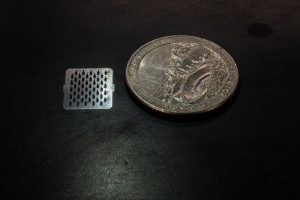Research papers show aspirin to negatively affect older populations
A series of research papers co-authored by a UI professor showed that daily use of aspirin by older healthy adults can have negative risks.
December 6, 2018
Three research papers co-written by a University of Iowa clinical professor has shown that daily low-dose aspirin may cause harm in older, healthy adults.
The papers focused on the Aspirin in Reducing Events in the Elderly trial, which is funded primarily by the National Institute on Aging. The trial was randomized and placebo-controlled, involving 9,411 generally healthy older adults in Australia and the U.S.
Michael Ernst, a clinical professor of pharmacy science, became the primary investigator at the UI as the university recruited participants for the study.
The research found that when adults aged 70 years old and older (65 years old and older for minority populations) took aspirin daily, it did not decrease the risk of dementia or disability, nor the secondary outcomes of cardiovascular disease or stroke.
“Aspirin is a widely used preventative agent for heart attacks and strokes, especially in people who already have existing cardiovascular disease or have had a stroke,” said Anne Murray, a co-principal investigator and professor at the University of Minnesota. “However, less is known about its role as a preventative in otherwise healthy older adults, despite the fact that many healthy older adults assume they should take it.”
Aspirin was also found to increase the risk of internal bleeding and to slightly raise mortality rates, despite Ernst’s and other researchers’ hopes of finding benefits of the medicine.
RELATED: UI study makes strides in coma treatment research
“We were hoping to find that an inexpensive, widely available, well-known drug could help healthy older adults live longer and remain healthy and independent,” Ernst said. “Because Iowa is a largely rural state with a high proportion of older adults, the study and its findings have great relevance.”
Murray said older, healthy adults should refrain from taking low dose daily aspirin if they do not have a history of heart disease, stroke, or cardiac procedures.
Ernst said additional analyses need to be completed to understand secondary outcomes of the study. Researchers plan on doing follow-up observations with participants to note any delayed or long-lasting effects that aspirin exposure may have caused.
“Cancer and dementia have long latency periods, and it is possible that the roughly five years of aspirin exposure during the intervention period may have effects in these areas that won’t manifest until several years down the road as participants continue to age,” Ernst said.
Dot Hinman, a participant in the study, said the study reassured her mental facilities were not declining and that she signed up because the over-65 age cohort is infrequently studied.
“I think that people of any age need to participate more often in studies,” she said. “It is only through such research that new discoveries are made, and all too often people seem to think that someone else will do it.”




















